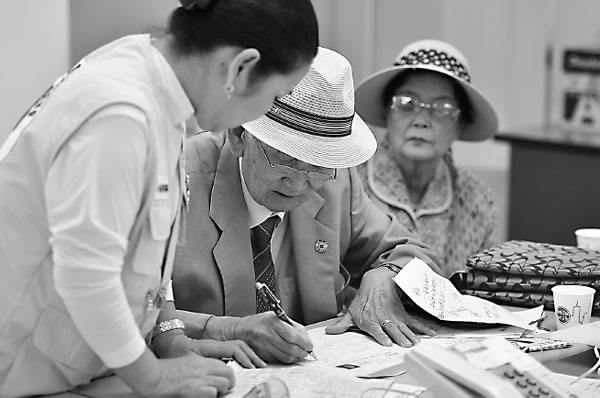Talks resume on family reunions
Seoul-Pyongyang deal would be first of its kind since early 2014
The Democratic People's Republic of Korea and the Republic of Korea started talks on Monday on resuming the reunions of families separated by the Korean War, Seoul officials said.
The talks among the Red Cross officials from the two neighbors at the border village of Panmunjom were made possible after the two nations struck a deal earlier this month that eased animosity that had them threatening war. The standoff flared after a mine explosion that Seoul blamed on Pyongyang maimed two ROK soldiers.
|
A Republic of Korea man who has relatives in the Democratic People's Republic of Korea applies at the Red Cross office in Seoul on Monday for an expected Korean family reunion program. Red Cross officials from the ROK and DPRK began talks on Monday on organizing a rare and emotional reunion for families separated by the 1950-53 Korean War. Jung Yeon-Je / Agence France-Presse |
The highly emotional reunions have not happened since early last year. Most applicants are in their 70s or older and desperate to see their loved ones before they die.
Monday's talks were expected to focus on confirming a date and venue for the event, with the most likely outcome a reunion at the DPRK's Mount Kumgang resort sometime in early October.
Many Koreans don't even know whether relatives on the other side of the border are still alive because their governments mostly ban the exchange of letters, phone calls and e-mails.
The reunion program began in earnest after a historic summit in 2000, and was initially an annual event.
But strained cross-border relations have allowed only one reunion in the past five years, with the DPRK canceling several at the last minute.
For the most recent reunion, in February 2014, a computer was used to randomly select 500 candidates after taking age and family background into account.
That number was reduced to 200 after interviews and medical exams, and the two nations drew up a final list of 100 each after checking if relatives were still alive on the other side.
For the lucky ones who do take part, the reunions are hugely emotional - almost traumatic - affairs, with many of the elderly participants breaking down and sobbing as they cling to each other.
The events typically last several days, and the joy of the reunion is tempered by the pain of the inevitable - and this time permanent - separation at the end.
The planned reunions are not a sure thing. The ROK and DPRK have a long history of failing to follow through on reconciliation efforts.
Some foreign analysts are skeptical about inter-Korean ties because of speculation that the DPRK will fire what it calls a satellite to celebrate next month's 70th birthday of its ruling party. Similar past launches triggered a standoff as the ROK and other neighboring countries called them disguised tests for long-range missiles.
About 22,500 Koreans had participated in brief reunions - 18,800 in person and the others by video - during a period of detente. None were given a second chance to meet their relatives, according to the ROK Red Cross.
AP - AFP
(China Daily 09/08/2015 page11)















